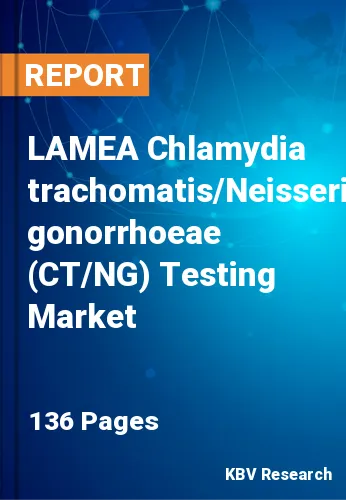The Latin America, Middle East and Africa Chlamydia trachomatis/Neisseria gonorrhoeae (CT/NG) Testing Market would witness market growth of 11.6% CAGR during the forecast period (2023-2030).
The most effective diagnostics for CT and NG screening and diagnosis are nucleic acid amplification tests (NAATs), which have a high level of sensitivity. A wide variety of specimen forms are appropriate for detecting NG infections, but for CT detection, vaginal swabs for women and first-catch urine for males are preferable for NAATs. The Centers for Disease Control and Prevention (CDC) recommendations acknowledge the use of endocervical samples in addition to these specimen categories. The ability to detect infection in both symptomatic and asymptomatic patients, including pregnant and non-pregnant women, is a critical component of a successful CT/NG screening test, and accepting a variety of specimen types maximizes clinician and client convenience, a key strategy to increase screening coverage.
The two distinct bacterial pathogens that cause CT/NG infections reach the host tissue in the urethra, anus, or throat only through sexual contact. Once inside the urethra, the bacteria infiltrate or attach to host tissue, triggering an inflammatory response often followed by a purulent discharge that the patient might observe. Then, both males' and females' urogenital tracts could become infected due to these microorganisms. Inflammation could result in issues with the prostate in males and the urethra, cervix, fallopian tubes, and uterus in women, perhaps leading to infertility in both sexes. In addition to discomfort, bleeding, or discharge from the anus, patients may also have ulcers, redness, or lesions in the mouth. The majority of patients, however, have no symptoms at all.
The prevalence of STDs or STIs are gaining a high momentum in the African region, which is leading to various health problems and serious complications. When compared to other regions, Sub-Saharan Africa has the highest annual STD cases. Infect papillomaviruses herpes simplex virus and the human papillomavirus are becoming more common in Sub-Saharan Africa. While there are more than 20 bacteria that cause STDs, they mostly manifest themselves in four syndromes and can thus be treated syndromically. Many government and major healthcare organizations are working together to improve the state of medical services, especially STD treatment across this region.
The Brazil market dominated the LAMEA Chlamydia trachomatis/Neisseria gonorrhoeae (CT/NG) Testing Market by Country in 2022, and would continue to be a dominant market till 2030; thereby, achieving a market value of $46.4 million by 2030. The Argentina market is showcasing a CAGR of 12.2% during (2023 - 2030). Additionally, The UAE market would register a CAGR of 11.3% during (2023 - 2030).
Based on Product, the market is segmented into Assays & Kits, and Instruments & Analyzers. Based on End User, the market is segmented into Diagnostic Laboratories, Hospitals & Clinics, and Others. Based on Testing Type, the market is segmented into Lab Tests, and PoC Tests. Based on Technology, the market is segmented into Isothermal Nucleic Acid Amplification Technology, Polymerase Chain Reaction, Immunodiagnostics, and Others. Based on countries, the market is segmented into Brazil, Argentina, UAE, Saudi Arabia, South Africa, Nigeria, and Rest of LAMEA.
Free Valuable Insights: The Worldwide Chlamydia trachomatis/Neisseria gonorrhoeae (CT/NG) Testing Market is Projected to reach USD 2.8 Billion by 2030, at a CAGR of 8.4%
The market research report covers the analysis of key stake holders of the market. Key companies profiled in the report include Abbott Laboratories, Becton, Dickinson and Company, ZeptoMetrix LLC (Antylia Scientific), Danaher Corporation, F. Hoffmann-La Roche Ltd., Hologic, Inc., Thermo Fisher Scientific, Inc., Bayer AG, Qiagen N.V. and Siemens AG.
By Product
By End User
By Testing Type
By Technology
By Country
Our team of dedicated experts can provide you with attractive expansion opportunities for your business.

